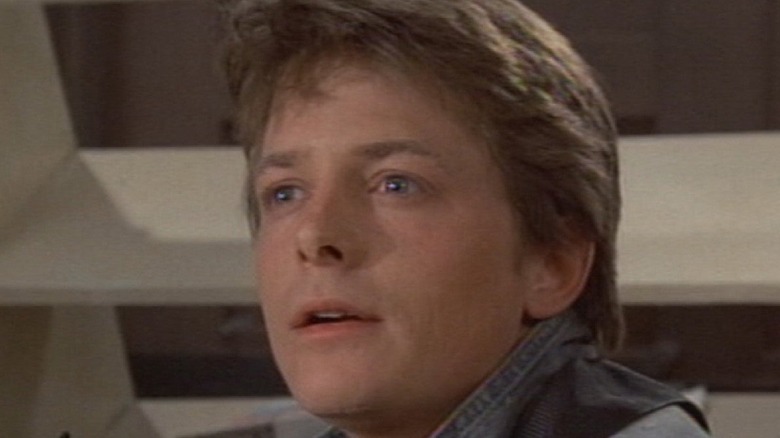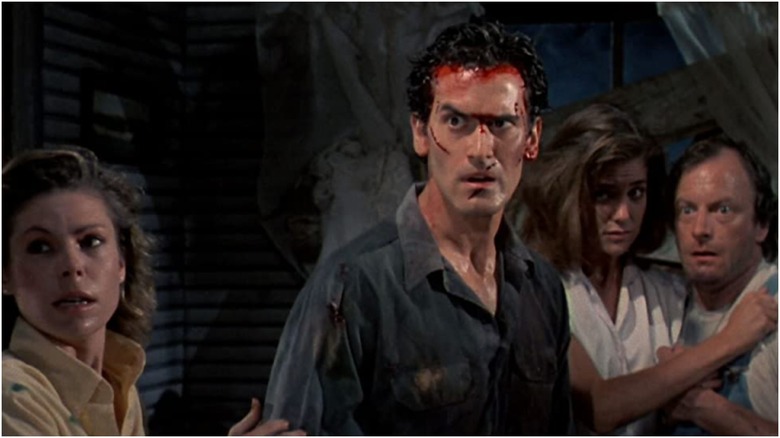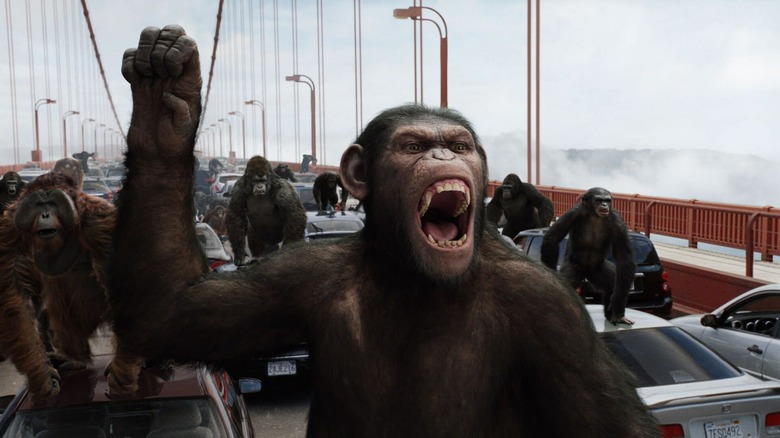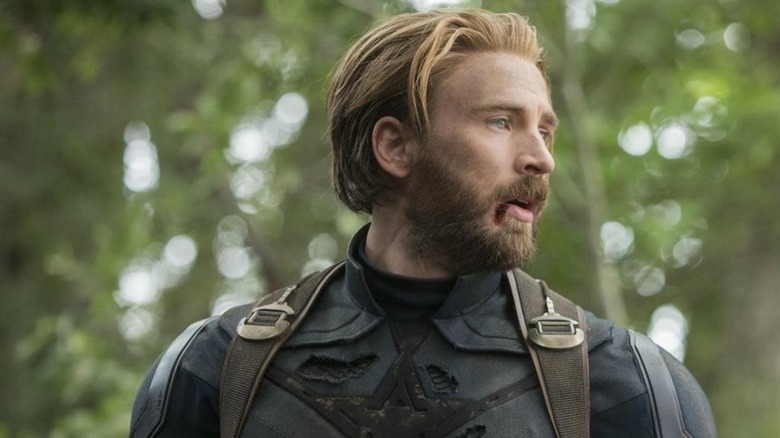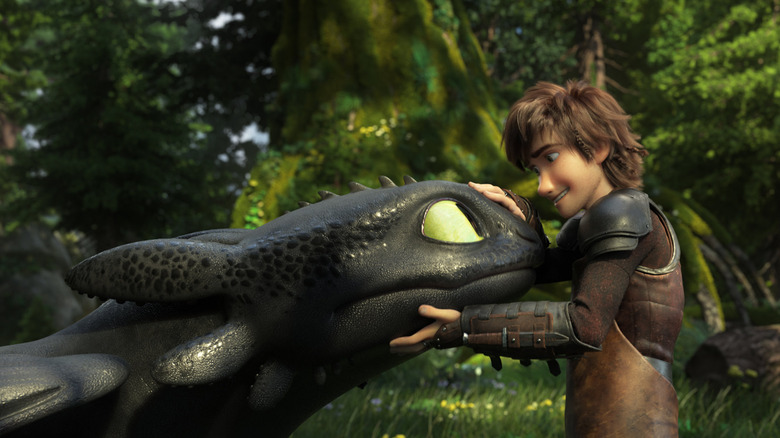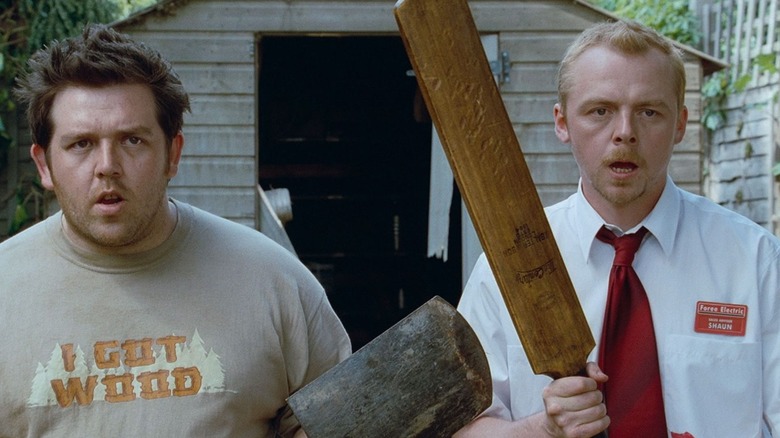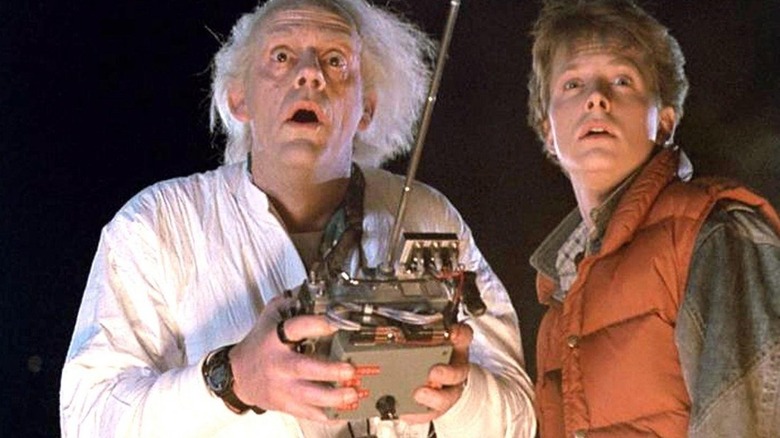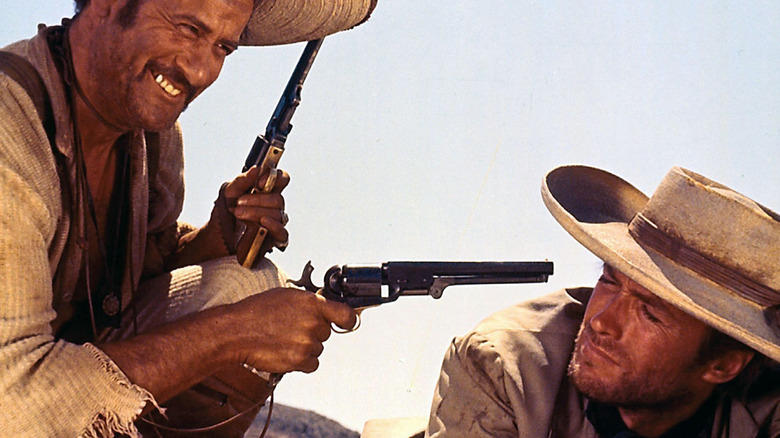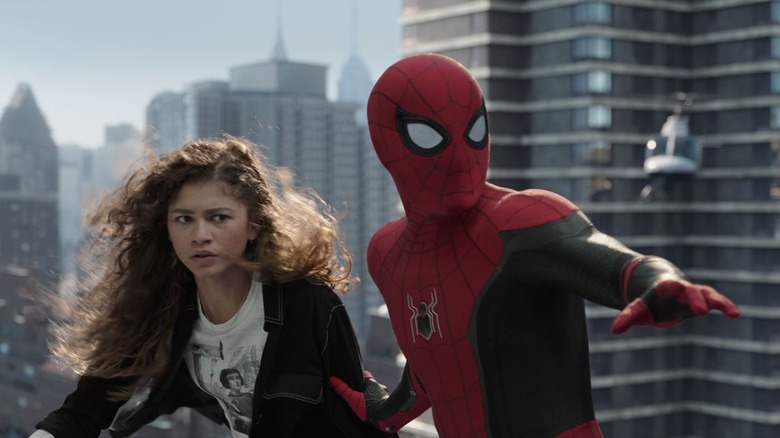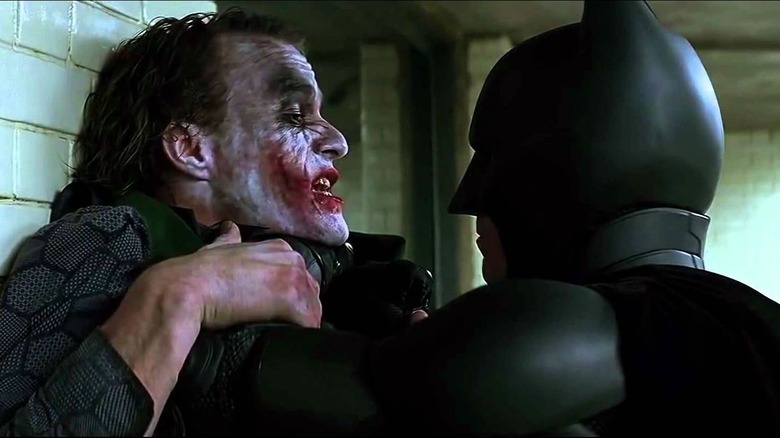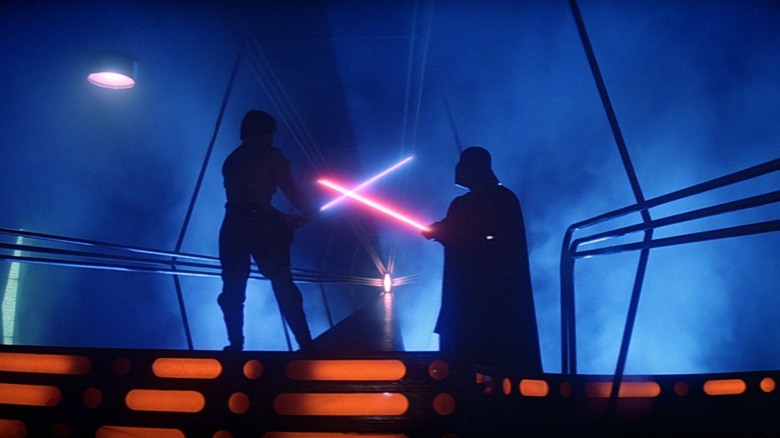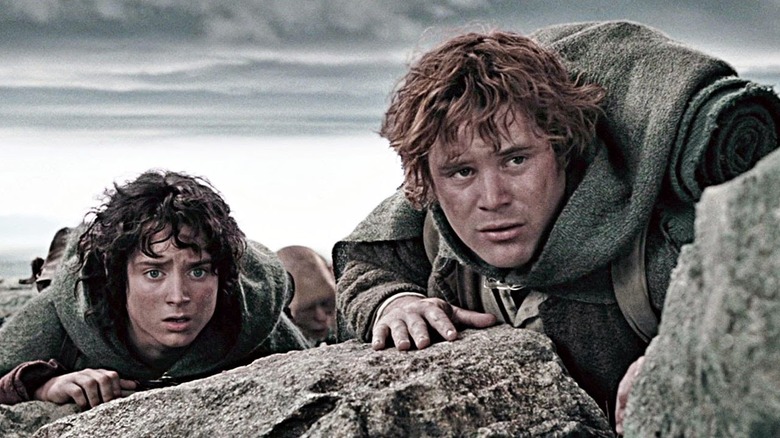The Greatest Movie Trilogies Of All Time
It doesn't matter if a filmmaker stumbles onto an unexpected hit and faces pressure to replicate magic with a pair of sequels, or if they were planning a three-part story from the very beginning: Making a good film trilogy is hard. And there are fewer contenders for the title of "greatest ever" than you might think. Some would-be classics ("The Godfather" trilogy, "The Exorcist," "Naked Gun," for example) had one or two hits, but didn't stick the landing enough with all three films to qualify. Other series ("Pirates of the Caribbean," "Terminator," "The Matrix," "Die Hard" "Indiana Jones" and "Toy Story" among them) eventually disqualified themselves by releasing fourth or fifth movies, sometimes years after having three great films that might've landed them a spot on an all-time greatest trilogies list.
Luckily, more than a few movie trilogies have been able to beat the odds and pass the gauntlet. Some movies in the following series might be better than others, but if they made it here, there are no true duds in the mix. Good trilogies contain two great films and one that's at least solid. The best trilogies are complete works of art — a beginning, middle, and end — that tell one epic story in three chapters. So what's on the list? Bust out the popcorn: These are the greatest movie trilogies of all time.
Evil Dead
The logline for 1981's "Evil Dead" might seem like well-trod ground for '80s slashers. Ashley "Ash" Williams (Bruce Campbell) and his friends head to a cabin in the woods, only to cause a demonic uprising after finding the Necronomicon and (unwisely) reading it aloud. But in spite of surface appearances, this is no paint-by-numbers slasher. Ash is far more of a fighter than anyone Michael Myers or Jason Voorhees ever hunted, with Bruce Campbell's hilarious, high-energy performance making him one of the best horror protagonists of all time.
This delightful gorefest got two sequels. "Evil Dead II" continues the story by essentially retelling it, only with more of the horror-comedy thrills fans had already come to expect. But director Sam Rami veered into a new direction for third installment "Army of Darkness," where Ash finds himself in a medieval fantasy, searching for the Necronomicon to get back home. It's a jarring third act, but Campbell's dependably badass performance is more than enough of a reason to give it a watch. Campbell and Raimi are a tour de force throughout all three campy, gory entrants into the greatest cult classic trilogy in horror history.
Planet of the Apes
No series about talking apes has any right to being as thought-provoking as the "Planet of the Apes" trilogy. No, not that one. No, not that one either. We mean the one that begins with 2011's "Rise of the Planet of the Apes," in which a proposed Alzheimer's cure grants captive monkeys human-level intelligence, which they naturally use to escape and form their own Stone Age society. The series continues with "Dawn of the Planet of the Apes," which sees humans and apes fight over a ruined San Francisco after the avian flu wipes out most of humanity, and concludes with "War for the Planet of the Apes." Here, the war spreads, and Caesar (Andy Serkis), the ape leader, tries to avenge his family after they are assassinated by a rogue human supremacist during a raid.
On paper, this all sounds preposterous. But when you're watching it play out onscreen, it's the exact opposite. Powerful live-action and motion capture performances from James Franco, Gary Oldman, Woody Harrelson, and, of course, Andy Serkis in the role of Caesar, bring these characters to life. It says quite a lot that a story about talking monkeys could teach us more about humanity than the vast majority of movies starring actual humans.
Captain America
At the time Marvel was casting for "The Avengers," Chris Evans wasn't necessarily an obvious choice for the role of Steve Rogers aka Captain America. His best roles prior to "Captain America" were as bad guys ("Scott Pilgrim vs. the World") or meatheads ("Not Another Teen Movie"). He wasn't a total stranger to playing superheroes, but few would consider his turn as the Human Torch in Fox's "Fantastic Four" movies a point in his favor.
But when Marvel's Captain America films came out, Evans was Steve Rogers. His performance is the best part of "The First Avenger," showcasing the character's World War II-era origins. This is followed by "The Winter Soldier," in which his old pal Bucky returns as a brainwashed Hydra assassin, and "Civil War," in which international collateral damage control turns friendships into rivalries, both of which represent blockbuster cinema at its finest.
It's not easy playing characters who could come across as too perfect. The writers keep things fresh not by giving Rogers flaws to overcome, but by putting obstacles in the character's path that challenge him, and us, to rethink the nature of patriotism and what it means to be a hero. The result is surprising: "Captain America" makes it cool to be truly, wholesomely good.
How to Train Your Dragon
Marked by the release of "The Road to El Dorado," "The Prince of Egypt," and "Shrek," the golden age of DreamWorks animation is a relic of the past at this point. But while Disney and Pixar may have decisively won the war, there's one animated DreamWorks franchise from the 2010s that holds its own against its more illustrious competitors.
"How to Train Your Dragon" follows Hiccup (Jay Baruchel), a gangly, unthreatening teenager who wants to slay a dragon to please his father, Stoick the Vast, chieftain of the mystical Viking village of Berk. However, after actually capturing the beast, he pities it, before using his new friend (named Toothless) to help defeat an even greater dragon threat. In the sequel, Hiccup, Toothless, and their friends uncover family truths and encounter new threats. Finally, in "How to Train Your Dragon: The Hidden World," Toothless falls in love while Hiccup searches for a dragon utopia and battles a vicious dragon hunter. This third film succeeds not just as a second sequel but as a satisfying conclusion to the story.
All three movies have humor, heart, and visually dazzling animation for miles. And because "Toy Story 4" disqualifies that franchise from inclusion here, that leaves "How to Train Your Dragon" as our pick for the best animated film trilogy ever made.
Three Flavours Cornetto Trilogy
You might also know it as the "Blood and Ice Cream" trilogy, or simply as "The Cornetto" trilogy. Still not ringing any bells? Don't be too hard on yourself. The trilogy isn't named after characters or overarching plots, because there is are none. "Shaun of the Dead" is about two immature best buddies who have to lead their friends to safety when a zombie virus breaks out in London. "Hot Fuzz" follows a no-nonsense London cop who uncovers a criminal conspiracy in a small English town with the help of a bumbling local constable. In "The World's End," old friends reunite for an epic pub crawl, only to find themselves in the middle of an alien invasion. What do you call a spiritual (but not literal) trilogy like this? As a joke, the creators made sure to include a specific brand of ice cream cones in each film and just named the whole thing after those.
But a dessert brand isn't the only thing these movies have in common. There's also brilliantly inventive direction from Edgar Wright, charming performances from twin leads Simon Pegg and Nick Frost (altogether one of film history's greatest director-actor teams), as well as huge laughs, peerless writing, and heartfelt themes that are consistently explored with disarming power. They might be narratively disconnected, but each of these films ranks among the most lovingly crafted comedies ever made. And that's more than enough.
Back to the Future
Many time travel movies have been made, and some are great. But in a lot of ways, they're all playing catch-up with the mighty "Back to the Future." The original 1985 movie features Michael J. Fox as Marty McFly, who goes back to 1955 in Doc Brown's (Christopher Lloyd) time-traveling DeLorean, and ends up having to play matchmaker between his teenage father and mother (the latter of whom, disturbingly, has the hots for him). The film's sequel sees Marty and Doc traveling to the future only to inadvertently bring back elements of it to the past, creating an alternate timeline where high school bully Biff Tannen becomes a powerful millionaire. In the third film, Marty goes back to the Old West to save Doc before he is killed by Biff's great-grandfather.
The sequels don't quite match the magic of the first "Back to the Future," but they are worthy successors that hold up in their own right. Thankfully, Hollywood bigwigs have been merciful enough to not resurrect this series with a fourth installment. You don't need one: These stand on their own.
The Dollars Trilogy
Like the "Three Flavors Cornetto" trilogy, there's no central plot that links the three films in the "Dollars" trilogy (also known as the "Man With No Name" trilogy). These spaghetti westerns, helmed by Italian director Sergio Leone, are instead named after the Man With No Name, played by Clint Eastwood in all his squinty-eyed, no-nonsense glory.
Each film features this nameless, poncho-wearing antihero of few words practicing vigilante justice throughout the sand-blasted Old West of the 19th century, when the only law enforcement around was whoever had the quickest draw.
In 1964's "A Fistful of Dollars," the Man With No Name enters a town split by corruption and greed, and plays the two rival families in charge against each other. In 1965's "For A Few Dollars More," the Man teams up with a bounty hunter to track down a Mexican outlaw. And in 1966's "The Good, The Bad, and The Ugly," the Man (the titular "Good") teams up with a rival (the "Ugly") to race a vicious criminal (the "Bad") to find buried treasure in a remote cemetery.
Other than the Man himself, the setting, and certain themes, the main thing linking these distinct chapters is the quality of Sergio Leone's work. All three rank among the finest westerns ever produced (the latter is considered one of the greatest films ever made, period, independent of the genre). Maybe westerns themselves declined in popularity after this because these three simply couldn't be topped.
The Home trilogy
In the lead-up to "Spider-Man: Homecoming," fans who'd already fallen in love with Tom Holland's Peter Parker from his cameo appearance in "Captain America: Civil War" expected something special, and they weren't disappointed. "Far From Home" was a worthy successor and a gift to anyone still mourning the franchise's spiritual finale in "Avengers: Endgame." By the time "No Way Home" was released, the Disney/Marvel team had turned exceeding expectations into an art form.
Tom Holland is perfect as the beloved character of Spider-Man. He combines the earnest dorkiness that defines Tobey Maguire's Peter Parker with the charm of Andrew Garfield's Spider-Man, and adds depth of his own. But anyone who missed those other two actors gets to see them (and some of their most iconic villains) join the rest of the stellar supporting cast in the third installment of this trilogy. It's pure fan service, but it manages to succeed where so many other nostalgia-fueled movies have fallen short.
At first glance, the trilogy refuses to retread the same origin story we've seen so many times already. But this is a ruse. The ending of "No Way Home" positions the entire "Home" saga as one gigantic origin story, opening the door to new Spider-Man films. After six MCU appearances, the character has far from overstayed his welcome.
The Dark Knight trilogy
The three movies in "The Dark Knight" trilogy might be stylistically inconsistent, but that's a feature, not a bug. It means each film is a standalone work of art with a distinct visual style that matches appropriately dark themes of fear, chaos, and pain. "Batman Begins" is rough around the edges to reflect the origins of the character. Bruce Wayne is inventing Batman as he goes along: Making mistakes, suffering, and learning what works. The two sequels are more polished because by then, both Christian Bale's Batman and director Christopher Nolan are more confident in their vision.
"The Dark Knight" is the trilogy's crown jewel as one of the greatest superhero movies ever made. Heath Ledger's Joker arguably outshines the rest of the cast, but he's far from the only thing here that works. And while "The Dark Knight Rises" doesn't quite live up to the standard set by its predecessor, it has more than enough energy, heart, and bombast to work.
Never before have movies treated the Batman mythos not just with respect, but as literary texts in their own right. By taking the material seriously and covering everything with grit and shadows rather than campy, mind-numbing action, these movies turn a story we're all familiar with into something fresh, engaging, and truly unforgettable.
Original Star Wars trilogy
There's something magical about "Star Wars." Sure, there are movies from the same period that have aged better, and many of the sequels have disappointed fans. But ever-growing legions keep coming back for more, devouring books, comics, TV shows, action figures, and video games, converting new generations, and making regular pilgrimages to an original trilogy that they hold in reverence.
The power of "A New Hope" is its simplicity. It's the same knight-saves-the-princess story we've seen since the dawn of literature, just with lightsabers and starships instead of swords and steeds. But the characters are timeless, and the world-building grabs the hearts and imaginations of fans in a way few fictional settings are capable of doing. "The Empire Strikes Back" does just what a sequel should, building on what works in the first, while challenging audiences with a darker tone and one of the greatest twists of all time. "The Return of the Jedi" is more uneven, but still a mighty conclusion to the story.
Still, the world's insatiable desire for "Star Wars" proves that George Lucas' story is far greater than the sum of its parts. It's a force of nature, a fundamental property of the universe with no end.
The Lord of the Rings
In "The Fellowship of the Ring," nine companions set off to destroy Sauron by casting his One Ring into the fires of Mount Doom, where it was forged. In "The Two Towers" and "The Return of the King," Frodo, Sam, and Gollum continue their journey to Mordor while Gandalf, Aragorn, Legolas, Gimli, Merry, and Pippin rally the free peoples of Middle Earth for the epic battle to come.
You could make the argument that it's cheating to include movies based on someone else's story, especially if the first two parts are clearly the beginning and middle chapters of a larger tale and not complete stories on their own. Our counter-argument would be this: The well-documented difficulties of adapting J.R.R. Tolkien's epic, massive, and labyrinthine "Lord of the Rings" books for the screen more than offset the convenience of having the story plotted out beforehand.
And even if that wasn't the case, Peter Jackson's impeccably cast, brilliantly acted series is too much of a masterpiece to ignore. It's filled with some of the greatest battle scenes ever filmed, breathtaking cinematography, and set to one of Hollywood's greatest musical scores by Howard Shore. Each movie tops the last and holds up incredibly well. But why are you taking our word for it? You're overdue for a rewatch.
